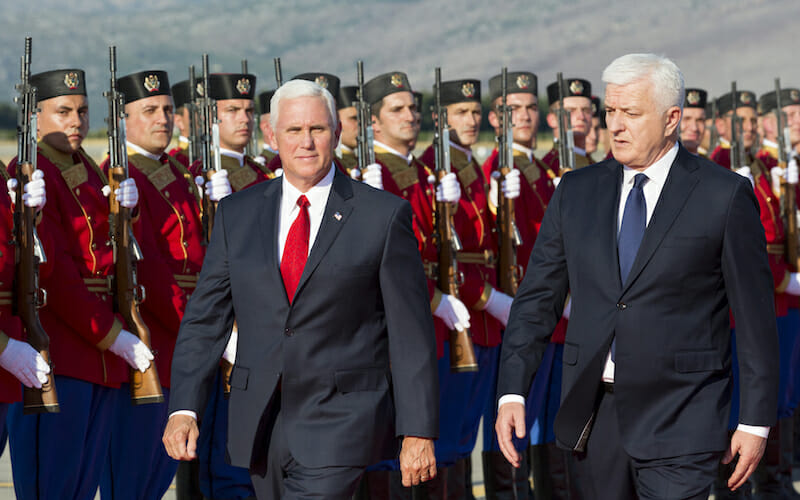
Serbia After the Atlantic Council’s ‘Balkan Forward’ Report
The US can achieve its security goals in the Balkans through closer ties with Serbia. The Atlantic Council’s “Balkans Forward: A New US Strategy for the Region” has redrawn attention to the political and economic vulnerability of the Balkans region.
Firstly, although US-Serbia relations soured in the post-Cold War era, a broader view of their historical relations demonstrates that there is a strong foundation for future development. Secondly, the US should have a pragmatic mindset when dealing with Balkan security problems, particularly Kosovo, and insist on NATO integration through added value initiatives such as infrastructure development and conflict resolution.
US-Serbia Relations
The ‘historical rapprochement’ highlighted in the report must begin with a clearer understanding of US-Serbia relations. US-Serbia relations date back to 1882 with US recognition of the Kingdom of Serbia. Serbia and the US were allies in the two world wars, and the United States played a role in the economic recovery of Yugoslavia after the Great War.
Apart from their allied victories, many Serbian-Americans were soldiers and pilots of the US army and air forces. Serbian immigration to the United States dates back to the early nineteenth century. Since then, Serbians have received a series of honours from the US government. One of them was Lance Lazar Sijan who received the Medal of Honour for his courage in the Vietnam War.
Mihailo Pupin and Nikola Tesla are also two prominent Serbian-Americans. Nikola Tesla’s immigration to the US contributed enormously to humanity through the invention of AC current. Mihailo Pupin – although less well known than Nikola Tesla – was a close friend of Woodrow Wilson and one of the founders of NASA. His invention of coils in America greatly improved the telecommunications industry.
Serbia should avoid developing relations with Russia on the basis of cultural emotions. Bilateral relations should be based on practical considerations rather than pretenses. Russia disregarded Serbia in place of Bulgaria after the signing of the San Stefano Peace Treaty in 1878. Russia wanted to support a ‘Greater Bulgaria and sacrifice Serbia to Austria in a period of imperial geopolitical interests. Additionally, although the Red Army liberated Belgrade in World War II, more complex factors contributed to Yugoslavia’s victory over Nazi Germany, including internal struggles against the occupation. To this end, Russia cannot be considered Serbia’s protector and common cultural ties have created the illusion that Russia has always been Serbia’s ‘bigger brother.’
Camp Bondsteel the only solution?
The report also argues that Camp Bondsteel is the ideal method through which the US can prevent border changes in the Balkans. The Kosovo forces (KFOR) have been NATO’s leading arm in leading peace operations in Kosovo since 1999. KFOR uses Camp Bondsteel as its central base to manage the unstable situation in Kosovo.
However, the US must examine alternatives to Camp Bondsteel to ensure US forces can effectively manage future operations. The airport in Ponivke near Uzice presents the most credible substitute having one of the longest runways in the Balkans, approximately 3100 m long. President Aleksandar Vucic announced in 2016 that the airport is available to ‘all modern aviation.’ Some media reports have flagged the idea that the European Union is interested in making the airport into a humanitarian centre to counter Russia’s own humanitarian centre in Nis. The flat area is ideal for developing a future military base and outweighs the capacity of Bondsteel in terms of aviation.
Overcoming the Kosovo Obstacle
Having one central military base in the Balkans at Ponivke would stabilize relations between Serbia and Kosovo. Holding Serbia back from future economic prosperity is the Kosovo problem. The benefits for Serbia’s accession to NATO and the European Union are clear. NATO integration is the channel through which Serbia will achieve security to obtain the economic prosperity that it will gain through membership in the European Union. The two must complement each other.
Kosovo’s independence was brought about without any referendum unlike Crimea and Catalonia. The undemocratic means that Kosovo took reduced its credibility in the international community. The country is not a UN member nor does it accept Belgrade’s authority. This is severely holding Kosovo – and its many communities – from having better economic conditions. Kosovo currently is one of the poorest parts of Europe with an unemployment rate of around 33%.
The Europeans, so far, have struggled to achieve outcomes throughout the Brussels talks even for small initiatives such as recognition of Serbian Municipalities. As such, the US should focus on effectively redirecting resources to overcome this issue. This will save the US a lot in the long run. Overcoming the Kosovo problem would give more impetus to Serbia to calm tensions in neighbouring Bosnia and Herzegovina. By assuring Serbia’s own territorial integrity and security means Serbia can play a constructive role in repairing relations between Republika Srpska and the Bosniak-Croat Federation.
Prospects for Development
The report offers sound suggestions on how to alleviate the Balkans from future crises, but without precisely outlining the policy means by which the US can ascertain its goals more effectively. The most credible way for the US to ensure security in the Balkans is through strengthening US-Serbia ties. Serbia is one of the parties to the Dayton Accords for Bosnia and Herzegovina and one of the parties to the Brussels talks on Kosovo. Resolving the two issues are paramount to cementing future stability in the region.
However, hindering Serbia’s prospects of dealing with the aforementioned regional challenges is the country’s insistence on balancing between East and West: that is between Russia and the European Union and United States. Rather than leaving Serbia caught in what former US Secretary of State John Kerry labelled a ‘line of fire,’ the United States should strengthen Serbia’s path towards Euro-Atlantic cooperation.
The way forward for the US is to consider Ponivke airport as its primary alternative, as well as insist on relieving tensions between Serbia and Kosovo. This is the starting point for regional stability in the Balkans. Such measures will place Serbia on a stable Euro-Atlantic course and avoid being caught between East and West.

